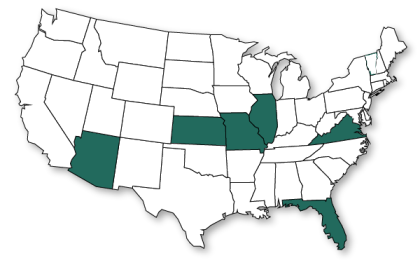Have you heard? The Great American Solar Eclipse will occur on August 21, 2017!
This full solar eclipse will traverse the United States from the Pacific Ocean to the Atlantic Ocean. The last total solar eclipse to cross the United States from coast-to-coast was 99 years ago in 1918. Missouri is projecting especially heavy volume – up to a million eclipse visitors! As a result, streets and highways across the state will be susceptible to very heavy traffic in the days before and after the eclipse. Take a look at this map of the eclipse path and review the tips below to stay safe and maximize your enjoyment of the eclipse.

If you plan to travel:
* Arrive in your viewing location at least one day-or ideally two days-in advance of August 21. Some interstate highways in or near the path of totality may become parking lots on the morning of the eclipse.
* Be aware of distracted drivers. Leave plenty of space between yourself and the car ahead as there may be drivers on the road who are unfamiliar with the area.
* If you have not yet secured lodging, plan to camp or take an RV. There will be plenty of temporary campsites on farms and empty lots.
* Be as self-sufficient as possible. Keep your gas tank topped, and if safely possible, carry extra fuel. Bring plenty of water, food, and toilet paper. Don’t forget sun-screen and hats.
* If you absolutely must stay in touch with family or work, rent a satellite phone. Cell phone systems may be overwhelmed. Carry extra cell phone batteries/chargers and bring an old-fashioned paper map in the event limited cell service disrupts navigation apps. It may be helpful to download a traffic app to stay informed of real time traffic data.
* Bring eclipse glasses, and be sure to grab them now before shortages occur. You’ll need these to watch the partial stages of eclipse. Learn how to safely view the eclipse.
* Get good eclipse maps of the path. These will be invaluable if you need to relocate, and they’ll make a great souvenir of the event!
* Watch the weather report on your local TV station in the days before the eclipse. Broadcast meteorologists will be giving eclipse weather forecasts. Try to relocate to another area early if your target destination has a poor weather prospect.
For those not travelling:
* Stock up on necessities up to a week ahead as stores may run low on supplies.
* Avoid the areas of peak congestion as much as possible. Consider rescheduling non-critical appointments to a day and time after the eclipse has ended.
Finally, enjoy the eclipse! This is a rare, once-in-a-lifetime experience-the next solar eclipse to touch only American soil won’t occur again until January 25, 2316!
*This article is from Progressive Insurance, and reprinted with minimal changes. *


